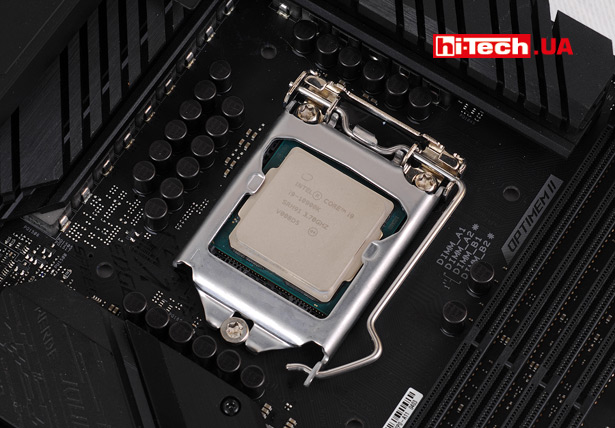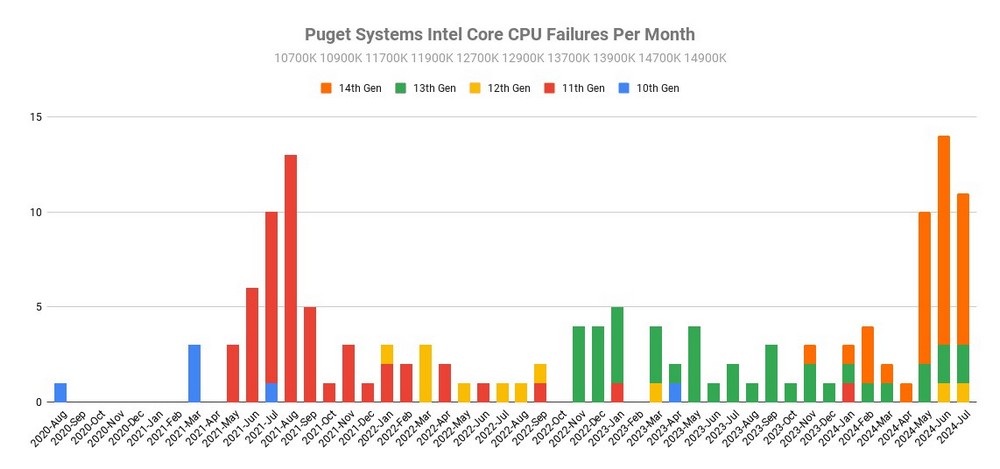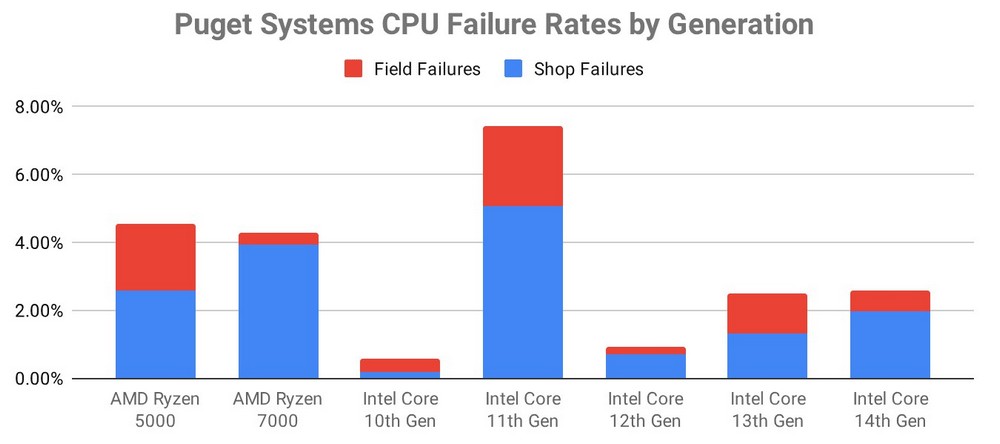AMD processors break twice as often as Intel 13 and 14 generations
08.08.24
High-end computer maker Puget Systems released statistics, according to which Intel 13th and 14th generation processors have a failure rate of just over 2%, while AMD Ryzen 5000 and 7000 systems have a failure rate of over 4%. This data is in stark contrast to reports from game developers, which cited between 50% and 100% failures of Intel chips.
Puget’s data also points to much higher failure rates in Intel’s 11th generation chips. According to Puget, the 11th generation Intel Core processors had the most failures of all others, at more than 7%. Problems with 11th generation Intel Core processors have not been widely reported.
Puget released the information as part of an announcement to extend the Intel system warranty to three years. Earlier, Intel announced the extension of the warranty on box processors of the 13th and 14th generations for two years. However, Intel did not specifically talk about applying the warranty to off-the-shelf systems from manufacturers, so Puget did so on its behalf.

The company points out that Intel’s 13th and 14th generation processors do have an increased failure rate, but not at an extreme level. Concerns about the reliability of these processors in the future are a much bigger problem than the current failure rate, they said. The company also provided data on failure rates, including AMD Ryzen 5000 and 7000 series processors. As you can see, the 11th Gen Intel chips failed much more often than the Ryzen, but the 13th and 14th Intel processors have a lower failure rate.

Puget Systems notes that it has not seen such failures since the 11th generation processors. Outages are occurring at the rate of 5 to 7 per month, which she says is hard to classify as a “big problem.” Puget Systems claims that probably due to using conservative BIOS settings and avoiding excessive voltage and power settings, Intel’s 13th and 14th generation processors have a lower failure rate in their systems.
As such, Puget Systems emphasizes the importance of system tuning and management to ensure processor reliability and longevity, while Intel’s 13th and 14th generation processors themselves show a lower failure rate compared to AMD’s Ryzen 5000 and 7000 series processors.
Don't miss interesting news
Subscribe to our channels and read announcements of high-tech news, tes
Oppo A6 Pro smartphone review: ambitious

Creating new mid-range smartphones is no easy task. Manufacturers have to balance performance, camera capabilities, displays, and the overall cost impact of each component. How the new Oppo A6 Pro balances these factors is discussed in our review.
Oppo Reno 15 5G smartphone review: confident

The Oppo Reno15 smartphone emphasizes design, a high-quality display, versatile cameras, and good battery life. Let’s take a closer look.
HP: Memory and storage now cover third of the PC cost business HP memory drive ram
If in 2025 the cost of memory and storage devices accounted for 15-18% of the total cost of components, now the figure is approaching 35%.
Starlink Mobile 5G will provide connection speeds of 150 Mbps even in the Arctic internet SpaceX
SpaceX is preparing to launch its global 5G-enabled Starlink Mobile service. The US Federal Communications Commission (FCC) has approved the launch of up to 15,000 direct-to-cell (D2C) satellites.


